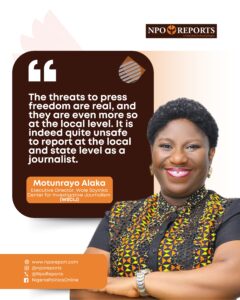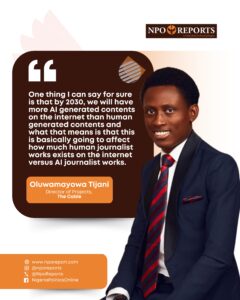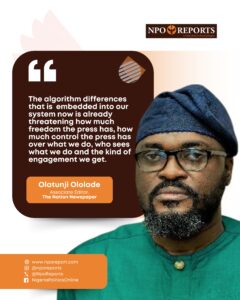Stakeholders in the Nigerian journalism industry have raised concerns over the increasing reliance on artificial intelligence in the media and the risks it poses in news reporting.
This was the discussion at the Wole Soyinka Center for Investigative Journalism WSCIJ’s conversation to mark the 2025 World Press Freedom Day.
The conversation which held on Monday, 5th of May, 2025, was themed, “Can the Press Stay free in an AI driven world?”
In her opening remarks, the Executive Director, WSCIJ, Motunrayo Alaka, established that there are threats to press freedom and noted that that the level of threat is higher at the local level.
She further stated that as journalists, it is unsafe to report on the subnational level.
“The threats to press freedom are real, and they are even more so at the local level. It is indeed quite unsafe to report at the local and state level as a journalist.”
 Speaking on the impact of AI in the newsroom, the Director of Projects, The Cable, Olumayowa Tijani, stated that while he has been studying Aritifical Intelligence for the past 2 years, he can say that by 2030, there will be more AI generated contents on the internet than human generated contents.
Speaking on the impact of AI in the newsroom, the Director of Projects, The Cable, Olumayowa Tijani, stated that while he has been studying Aritifical Intelligence for the past 2 years, he can say that by 2030, there will be more AI generated contents on the internet than human generated contents.
According to Tijani, this is going to have an effect on how much human journalist works exists on the internet versus AI journalist works.
He further noted that as at 2025 it was already recorded that there were over 1250 AI generated news websites across the world.
“Now if that is happening, it means we are now in competition with machines when it comes to reporting
“The algorithm differences that is already embedded into our system now is already threatening how much freedom the press has, how much control the press has over what we do, who sees what we do and the kind of engagement we get.” He said.
 In the same vein, Olatunji Oladele, Associate Editor, The Nation Newspaper, stated that the rise of what he described as “prompt-driven” journalism poses a serious threat to the integrity and value of the media.
In the same vein, Olatunji Oladele, Associate Editor, The Nation Newspaper, stated that the rise of what he described as “prompt-driven” journalism poses a serious threat to the integrity and value of the media.
“The most important consideration is the human factor, we have to deal with the nature of the human elements driving contemporary journalism practice. Now we are faced with an affliction of the prompt driven journalists.
According to him, AI only allows the illusion of reporting without the effort of engaging with the the real facts on ground. He also noted that while AI only avails surface level treatment and analysis to issues, it lacks the depth and context that real reporting provides.
“To so many journalists now, AI provides an escapist model of practice. It provides an immediate escape from the grind of hopping in the trenches to dig for truth. You can’t sit in Lagos and report terrorism in Borno, what AI will always avail you is simply a superficial treatment and perspective to issues.
“To get to the root of the matter, you’ll have to travel down to the scene of the conflict and that is what AI denies you complete recourse to AI renders journalism vulnerable to manipulation as to which journalism ought to play the role of watchdog in the first place.”
He harped on AI being just a mere tool to aid journalism practice, and not form the core of how it is practiced because a complete dependence on AI will always elicit distrust from the audience.


